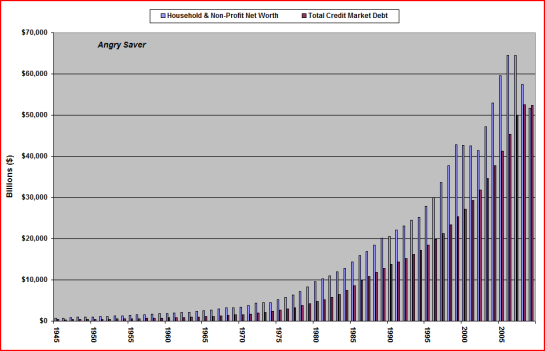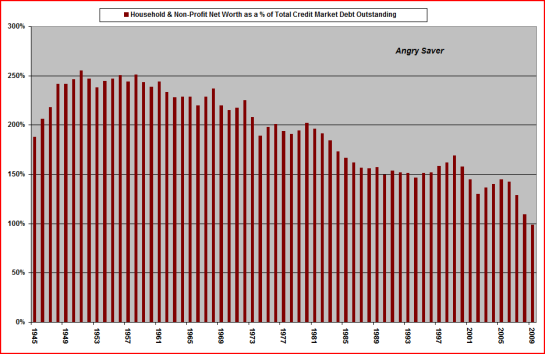(March 17, 2010)
Total credit in the U.S. has surpassed household net worth. We are
insolvent.
Total credit in the U.S. has surpassed household net worth. Without getting
too fancy--even without counting the gazillion dollars of derivatives floating
around, and all the off-balance accounting tricks of the banks, etc.--this is the
definition of insolvency (debts exceed assets).
Astute correspondent Angry Saver submitted two charts for our review, and some
explanatory commentary.


In the new eCONomy, "Extra Credit" isn't what it used to be! Maybe that's because
"credit" is a warm and fuzzy name for DEBT!
With all the financial propaganda that's spewed about by the MSM, it's very easy
to lose sight of the big picture. With that in mind, I wanted to share two of my
charts with you.
The two charts compare two broad and distinct measures over time -
total credit market debt and total household & non-profit net worth.
I was trying to show the broadest debt/wealth picture possible and avoid comparisons
to GDP. In general, I think the focus on GDP (basically spending) misses the point
- the excessive level of debt in the system. Admittedly, it's an imperfect
comparison based on imperfect measures, but very telling nonetheless (imho anyway).
Hopefully the following will help clarify the charts. All data is from the Fed's Flow
of Funds tables.
Total credit market debt is a measure of ALL issued debt in the system
including state, local and federal government debt, household debt (mortgage, consumer,
etc.), non-financial business debt, financial debt and foreign debt. Social Security Trust funds
debts of ~ $ 5 trillion are NOT included as they are not marketable and explicit
debts of the U.S. Government.
Though not all-encompassing, Household and non-profit net worth is a broad
and widely recognized measure of a nation's net wealth, including real estate, plant,
equipment, stocks, bonds, etc. Wealth/resources such as national parks are not
measured/included.
(Off topic - the debt creators and wealth extractors are already
scheming to transform these types of shared and generally free wealth into rental
streams. Beware! The last thing we need is for banksters and CONgress critters
to transform existing and shared wealth into yet more unproductive debt. Grrrrrr!)
Our credit system is primarily based on collateral. So in a way, the charts show
how much collateral has been monetized and is available for monetization at a given
point in time. It's a dynamic system affected by many factors such as interest
rates and credit policies.
As the charts show, total credit market debt now exceeds total household net
worth for the first time! Note: I used an average of household net worth for
years 2008 & 2009 to dampen some of the huge swings in asset values. For all
other years the household net worth data is as of the end of Q4, per the Flow
of Funds. The averages I used for 2008 & 2009 made 2008 look slightly better
and 2009 slightly worse, but I think the averages are more representative of the
trend most people are experiencing. I also think the averages remove some of
the huge distortions created by the Fed and mark-to-fantasy accounting.
As a point of reference, at the end of Q1, 2009, household net worth was only
92% of total debt and falling fast! Is it any wonder Bernanke started
quantitatively (dis)easing and CONgress suspended mark to market accounting rules
in March of 2009? If a nation's issued debt exceeds the total net-wealth of
its citizens, exactly where is the collateral for more lending? Is it wise
to preserve trillions in unproductive and fraudulently issued debt?
Is it wise to allow a few members of the Fed to imbue so much un-earned wealth
and power to the issuers and holders of said debt?
So much for being the
wealthiest nation ever. Financial innovation? Please. A pyramid of ponzi debt.
In some circles, when the debt of a nation exceeds the wealth of the nation's people,
it means insolvency. Yeah, yeah, I know, it's a check book system....we
owe ourselves...financial debt is double counting. Bah! Hogwash!
For numerous reasons, our actual financial situation is much worse than shown in
the charts. For one, assets values are still very rich on a historical basis,
though low rates do offer support for current values. For another, the total
debt numbers do NOT include the ~ $5 trillion in trust fund debts for social
(in)security, etc. For yet another, tens of trillions of future medical and
retirement liabilities are not included either.
I could go on and on about competitiveness, demographics, wealth distribution,
etc., but there's no need.
As I see it, we don't just have a wealth distribution problem, we have TOO MUCH DEBT
relative to our wealth.
Maybe it's just me, but I find it very troubling that our Government is willing
to explicitly guarantee Wall St. bank debts and trillions in fraudulent Wall St.
credit, but they won't explicitly guarantee entitlements that people have been
paying taxes into for decades. Hank Paulson's recent op-ed in the WSJ claiming
we had to get a handle on entitlements should be a wake up call for the majority.
When a Wall St. operative like Paulson wants to "address" entitlements,
it likely means the majority are about to be short-changed. I'm not making a
judgment about whether or not we can afford all of the promised entitlements.
The point I am making is that the opinions of Paulson and all the other Wall
Street bailout recipients should be viewed very critically.
Credit creation in a fiat system is a privilege. Used wisely, credit can increase
output without inflation. Under the stewardship of venal bonus seeking bankers
like Paulson, the credit creation privilege was used to extract wealth rather than
create wealth. The Fed and their policy of inflation enabled Wall Street to
skim trillions from Main Street.
Decades of reckless credit creation, bubbles and shams. Cui bono? Hank
Paulson and Wall Street. Why would anyone value their opinions?
As always, comments and criticisms are welcomed.
Thank you, Angry Saver, for an excellent explanation of your sobering charts.
I know there are quibbles to be made about the balance sheet represented here.
Some will no doubt claim that Muir Woods, the Hoover Dam, the Strategic Oil Reserve,
etc., are worth trillions, but this is a pointless "feel-good" exercise because
the Federal government is not selling Muir Woods, the Hoover Dam,
and the Strategic Oil Reserve. (Local governments are however rapidly selling or leasing
their parking meters, toll roads, etc., in a desperate attempt to raise enough money
to fund their pension obligations for the next six months.)
The salient fact is that all public debt is a liability against taxpayers who have
to pay interest on that debt. The only "real" thing about the trillions in
public debt is the $450 billion the taxpayers spend on interest every year
(and that's just Federal debt, not state and local government bonds debt).
Even if someone were to conjure up $20 trillion in government-owned assets ("get your
world-class global Empire right here!"), as Angry Saver noted, you would also have
to include the future liabilities of Social Security, Medicare/Medicaid, Veterans
Administration benefits, etc., which are conservatively estimated at $60+ trillion.
And then there's the little matter of the $1.6 trillion Federal deficits piling up every year
until Doomsday.
I think a very strong case can be made that the real estate, stock and bond assets
of the U.S. are grossly overvalued, and once interest rates rise to more typical
levels (as they most assuredly will) then an easy $10 trillion will be instantly
shaved off the bloated valuations of all interest-rate-sensitive assets, which
include real estate, stocks and bonds.
Given the absurd overvaluations currently hidden by "marked-to-fantasy" assets
in bank balance sheets, I would guess we're actually $5 trillion in the hole right
now, were all assets instantly marked to market.
It is tiresome indeed to hear the constant exhortations of the Status Quo and the MSM
touting more debt as the solution to our "growth problem." Garsh, do you think the
"growth problem" might be causally linked to the "debt problem"?
We're bankrupt, Baby. The travesty of a mockery of a sham can be extended for
a time (at least until the November elections), but it cannot be extended indefinitely.
If you haven't visited the forum, here's a place to start. Click on the link
below and then select "new posts." You'll get to see what other oftwominds.com readers and
contributors are discussing/sharing.
DailyJava.net
is now open for aggregating our collective intelligence.
Order Survival+: Structuring Prosperity for Yourself and the Nation and/or
Survival+ The Primer
from your local bookseller or from amazon.com or in ebook
and
Kindle formats.
A 20% discount is available from the publisher.
Of Two Minds is now available via Kindle:
Of Two Minds blog-Kindle


"This guy is THE leading visionary on reality.
He routinely discusses things which no one else has talked about, yet,
turn out to be quite relevant months later."
--Walt Howard, commenting about CHS on another blog.
NOTE: contributions are acknowledged in the order received. Your name and email
remain confidential and will not be given to any other individual, company or agency.
|
|
Thank you, Pam C. ($20), for your enduring support
of this site, and for all you do as a key member of The Remnant.
I am greatly honored by your support and readership.
|
|
Thank you, John R. ($40), for your many outrageously generous donations
to the site.
I am greatly honored by your support and readership.
|
Or send him coins, stamps or quatloos via mail--please
request P.O. Box address.
Your readership is greatly appreciated with or without a donation.
For more on this subject and a wide array of other topics, please visit
my weblog.
All content, HTML coding, format design, design elements and images copyright ©
2010 Charles Hugh Smith, All rights
reserved in all media, unless otherwise credited or noted.
I would be honored if you linked this wEssay to your site, or printed a copy for your own use.



